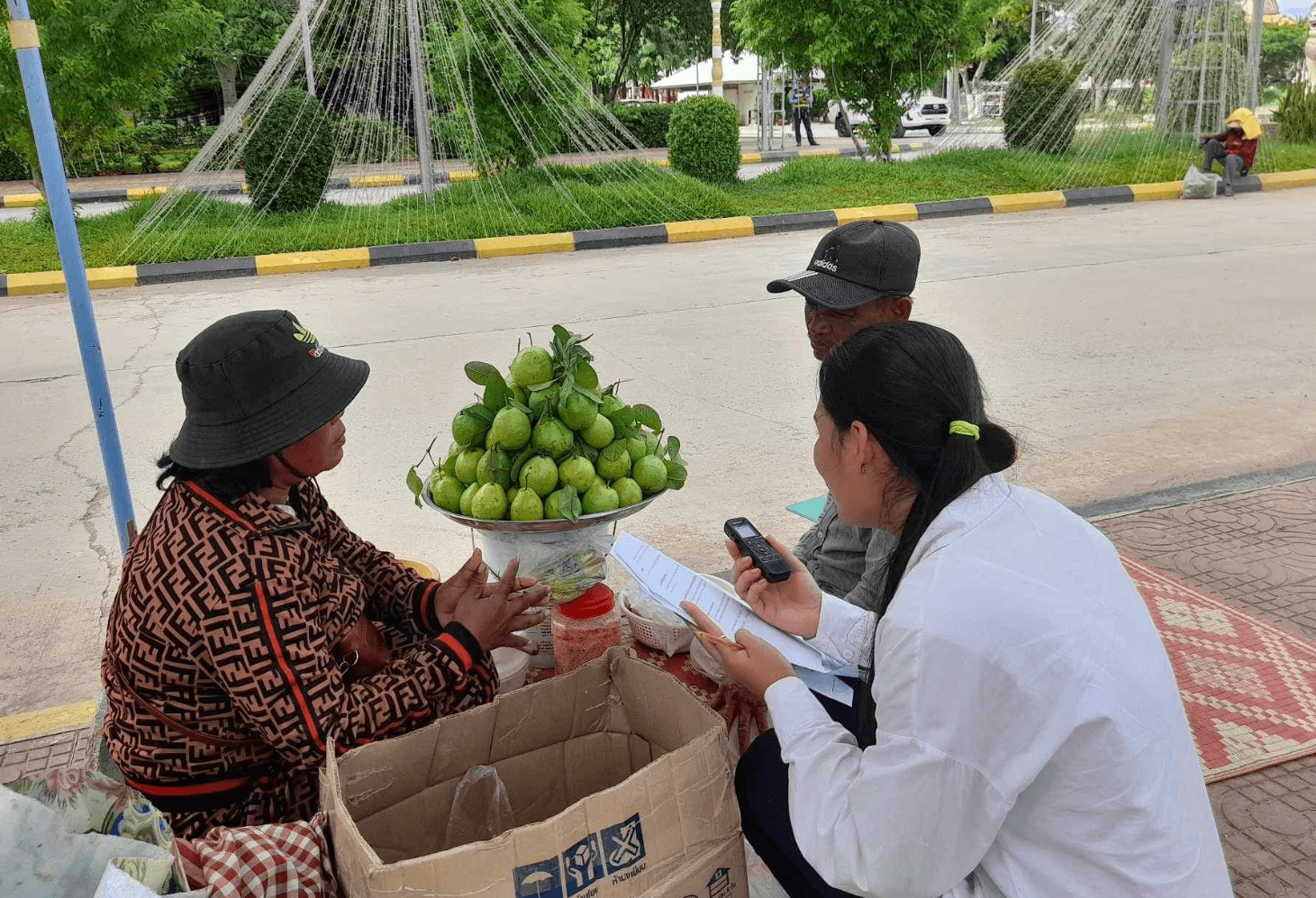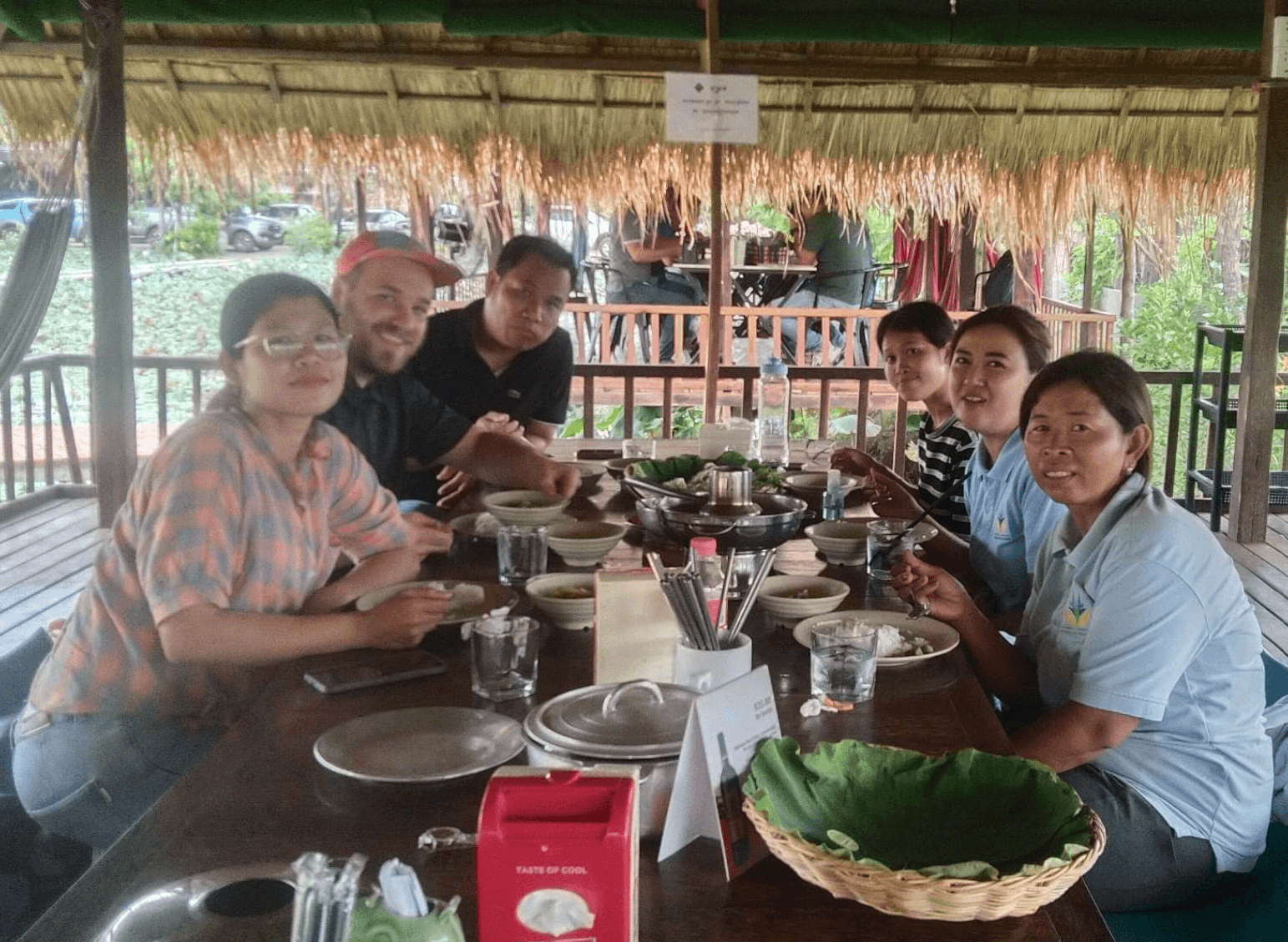Targeting Domestic Violence through Small Business Leaders in Cambodia
Cambodia is home to beautiful tropical foliage and renowned monuments from the Angkor Era. However, Cambodia is also known for the 1970’s Khmer Rouge genocide where as many as 3 million people (an estimated 40% of the population) were systematically killed. The country now enjoys a relatively stable government and some early economic growth. Nonetheless, Cambodia continues to suffer in multiple indicators of growth because of this period; particularly their mistreatment and domestic violence against women. One in five Cambodian women aged 15 to 64 have reported experiencing physical or sexual violence by an intimate partner in their lifetime. As domestic abuse is considered a family matter, the protection and empowerment of women are rarely discussed in public, making change difficult to accomplish on a national scale.
Our Project at a High Level
To ensure impact and sustainability, our project centers around the United Nations Sustainable Development Goals, specifically the UN Gender Equality Sustainable Development Goal (Goal #5). In this project we will create support systems that we envision will lead to long-term, sustainable behavior changes that will protect women and children and decrease domestic violence. While we are still conducting social issue context and best practice research, we hope to increase awareness of domestic violence through small businesses through business and sensitivity training to empower both women and business owners to reduce domestic violence in Cambodia.
37% of women and 16% of men agreed that a husband was justified in wife beating.
This is highest in our target region of Battambang, as 63% of women there believe this idea.
Why Cambodia?
Because of Cambodia’s unique history, continued status as a global south region, and normalization of domestic violence, Cambodia is the ideal location for our project. Cambodia is considered “off track” in multiple UN indicators on domestic violence. Cambodia is off track in indicator 5.2.2 “proportion of women and girls aged 15 years and older subjected to sexual violence by persons other than an intimate partner in the previous 12 months”. Cambodia is below in indicator 5.2.1b “proportion of partnered women and girls aged 15 years and older subjected to physical, sexual, or psychological violence by a former or current intimate partner.”
Interestingly, according to Cambodia’s 2023 Demographic and Health Survey, 37% of women and 16% of men agreed that a husband was justified in wife beating. This is highest in our target region of Battambang, as 63% of women there believe this idea. Of women who have experienced domestic abuse, 43% have long-term sustained injuries (National Institute of Statistics et al., 2023).
There has also been no SDG data collected on indicator 5.c.1 which is the “number of institutions which monitor and allocate budget to promote gender equality and strengthen and empower women”. And because 53% of women who have suffered domestic violence neither sought help directly nor told anyone, large-scale initiatives have yet to take place (National Institute of Statistics et al., 2023). This is a pain point we would like to address in our research as we create institutionalized spaces for women and girls to flee domestic violence through small businesses.
Our second initiative, for which we are seeking funds, is a pilot social impact project where we will test our theories and methods. This initiative is expected to start in Cambodia in April 2024 and will involve the initial training of business leaders in Battambang. Below are high-level details on the initiative:
- We will randomly select fifty small businesses in Battambang Province to receive our business and sensitivity training.
- Business leaders will receive training on how to track revenue for their small businesses as well as training on domestic violence in their community.
- The final stage of training for small businesses will be to hold small local events with food, music, and motivational speakers where gender equality and anti-abuse messaging are shared which will increase domestic violence awareness in their community.
We will have 1) a control group (no intervention) and two treatment groups: 2) a group that receives general business training and 3) a group that receives general business training and training on domestic violence. We expect to see revenues and consumer perceptions of the businesses in group 3 increasing more than those of the other two groups.
After the pilot project, we will launch a larger project, across the three largest cities in Cambodia (Phnom Penh, Siem Reap, and Battambang); we anticipate funding from an outside organization will cover this larger project.
We plan to implement a culturally responsive human-centered design methodology; this means that we will research the culture of domestic abuse, gender, economics, interpersonal relationships, and current best practices before implementing our intervention. We use local employees and partners to ensure that we have an informed understanding of domestic abuse in Cambodia for those experiencing it. We are in the process of partnering with expert organizations in this field including the Cambodian Women’s Crisis Center, Peace Bridges, and other local NGOs. With the help of these partners, continued research, and local employees, we believe we will be able to implement a solution that will be successful to the unique challenges in Cambodia.
We hypothesize and aim to show with sound empirical research, that through both business and domestic violence training, business owners will have greater fulfillment, have happier employees, help establish strong norms against domestic violence, and enjoy higher revenues as they are seen as pillars of their communities. We refer to these collective actions and benefits as “business as a force for good.”
Our Qualifications For This Research Project
Much of our principal investigator, Dr. Beck’s previous and current academic research has been on “business as a force for good,” or as it is called in the marketing academy “marketing for a better world.” On this Cambodia project, he and the other researchers have spent thousands of hours: interviewing Cambodians via remote calls, studying research coming out of that region of the world, and reading books about the Khmer Rouge, the current political atmosphere, and how to empower women to change the world. Dr. Beck has managed much of the first phase of research where he had in-field Cambodian partners conduct brief face-to-face interviews with 150 consumers and in-depth interviews with 120 business owners. Analysis of these qualitative interviews is currently underway.
Dr. Beck’s 10+ years of industry experience consulting with over 50 small businesses in a variety of roles helps him know how best to communicate and empathize with Cambodian small businesses. Additionally, his 2-years of missionary service in Asia gives him cultural insights. His leadership experience there and in America has helped him have more empathy and understanding of prevailing social issues.
Other academic collaborators on this project include Stefan Wuyts (Professor of Marketing at Penn State), Bruce Money (Professor of Marketing at BYU), Franziska Schmid (Assistant Professor of Marketing at Oregon State University), and Nate Allred (Assistant Professor of Marketing at Texas Tech University). Our research manuscript is expected to be submitted to The Journal of Marketing by the Spring of 2025.
Read more about the research team here
Subscribe to get the latest news
It takes a village to raise a child, or help a village overcome domestic abuse problems. If you’d like to join our village, and either directly get involved or just follow along with this humanitarian research project you can signup here to be added to our newsletter.

